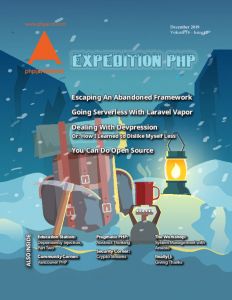In the past few years, I’ve been involved with four teams who built their bread-and-butter applications on the classic Zend 1 framework. Each team realized the framework was no longer supported, and each has struggled to figure out their next step. On each of these projects, I’ve seen triumphs and tragedies. In this article, I want to share what I’ve learned about struggling to get out of an abandoned framework.
Recently, Taylor Otwell, the creator of Laravel, launched a new service for deploying your Laravel applications in AWS: Laravel Vapor. It doesn’t require maintaining servers or setting up your own AWS services, networks, or security group configurations. This article dives into what Vapor is, why you should consider going serverless, and how to deploy an application to it.
Most of my life was spent wondering what was wrong with me. Why was I always so angry and scared? Was it always going to be this way? After a series of events, I decided to do something about feeling this way and get the treatment I needed. This is how I learned to hate myself less.
Have you ever contemplated whether it’s necessary to contribute to open source? Ever been at a point where you think open source is too complicated to delve into? Have you ruled out open source because you believe it’s a community where people come to massage their ego? In this article, we’ll be looking into how everyone can contribute to open source, as well as how beneficial it can be for our careers and the software engineering community at large.
Last month, I talked about the basic idea of what dependency injection is and its importance. Now that we’re more familiar with it, we’ll look at examples of using dependency injection for managing object coupling, moving object creation externally, and keeping your classes concise.
Ansible is an open-source IT automation tool used for configuring systems and deploying applications. Red Hat supports Ansible in the enterprise by offering support contracts and funding employees who contribute. Ansible communicates over SSH, so there is no need to install any extra software (such as PHP, Apache, NGINX, Redis, and others) on the remote systems. Ansible allows us to version control our infrastructure in YAML files and supports Jinja templates allowing flexibility in the configuration of services and applications. This month we’re going to review Ansible’s core concepts and start building our first playbook to begin our transition to infrastructure as code
Software is built of abstractions layered on top of more abstractions. We, therefore, all do abstract thinking one way or another. But there is one form of abstract thinking which can help us to understand—and communicate—how the whole system works. We’ll use the flow of a river as an analogy to help communicate that type of understanding.
The goal of any encryption operation is to scramble the patterns in the plaintext source data and otherwise protect its contents by rendering a specific message indistinguishable from random noise. A cryptographically-secure algorithm or implementation is one that can be mathematically proven to render data in such a state—there is no mathematical way to analyze or extract information from a securely encrypted payload. The most important feature of an encryption system, though, is we can revert such a scrambled message to a readable format via a known operation and a specific piece of private information—the decryption key.
For our next stop on our tour of user groups, we travel to the Great White North of Vancouver, British Columbia, Canada. Vancouver is often listed as a top city to live for quality of life, and it’s one of Canada’s densest and most ethnically diverse cities. Over recent years, Vancouver has gotten the tag of Hollywood North, becoming home to many top film productions.
I’m writing this article shortly after the Thanksgiving holiday celebrated in the US. Combined with the fact that 2019 is rapidly coming to a close, I find myself reflecting over the last year and even a bit farther back. I think that there has been a lot that the PHP community can be thankful for.






Leave a comment
Use the form below to leave a comment: